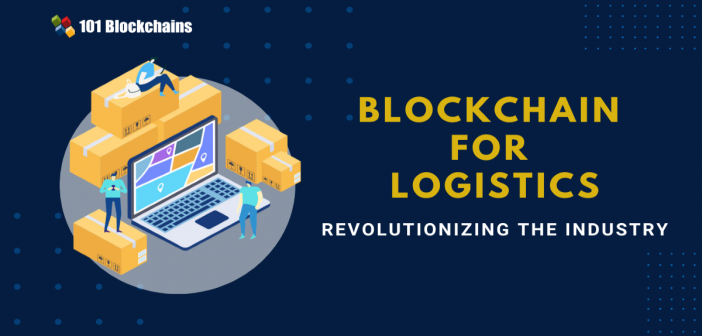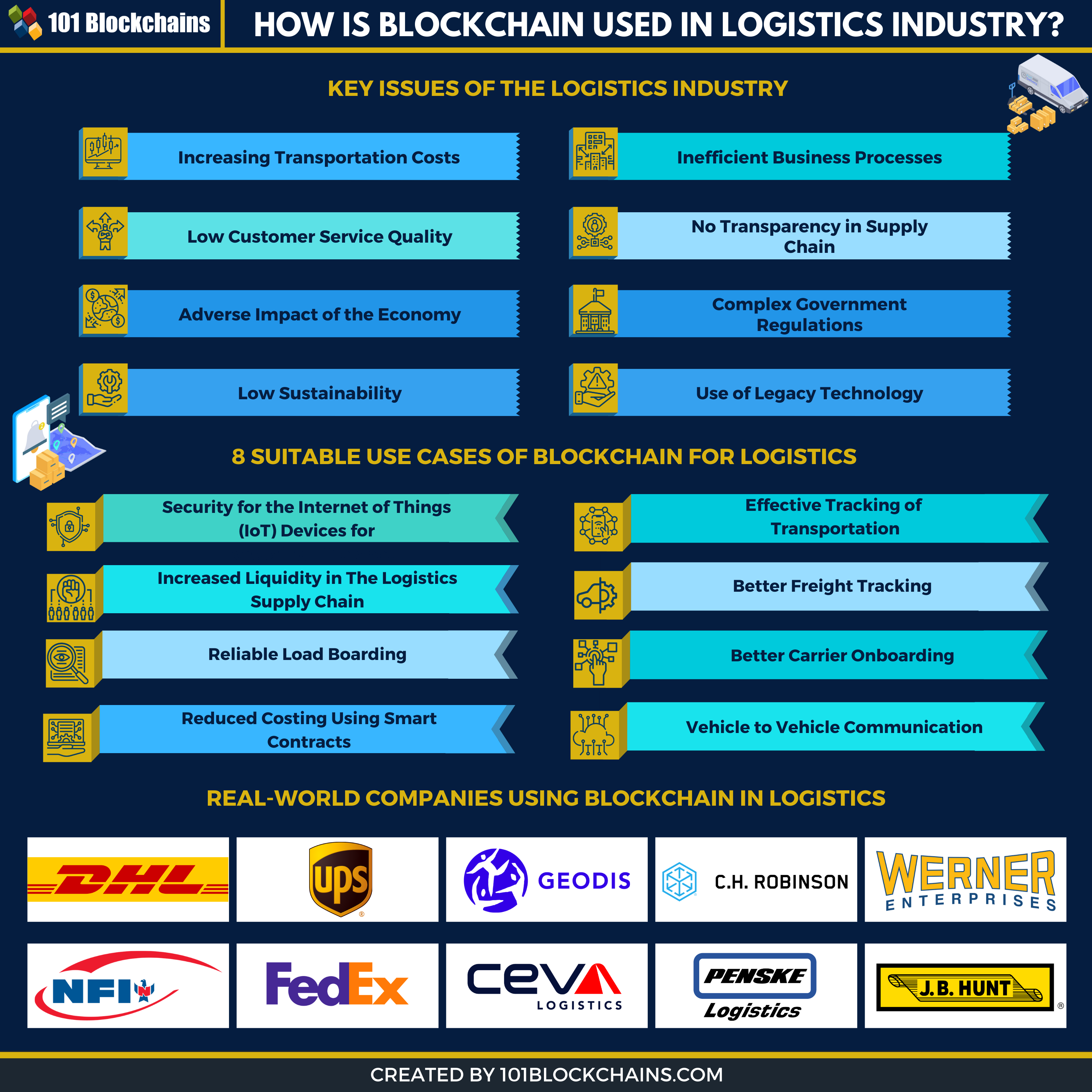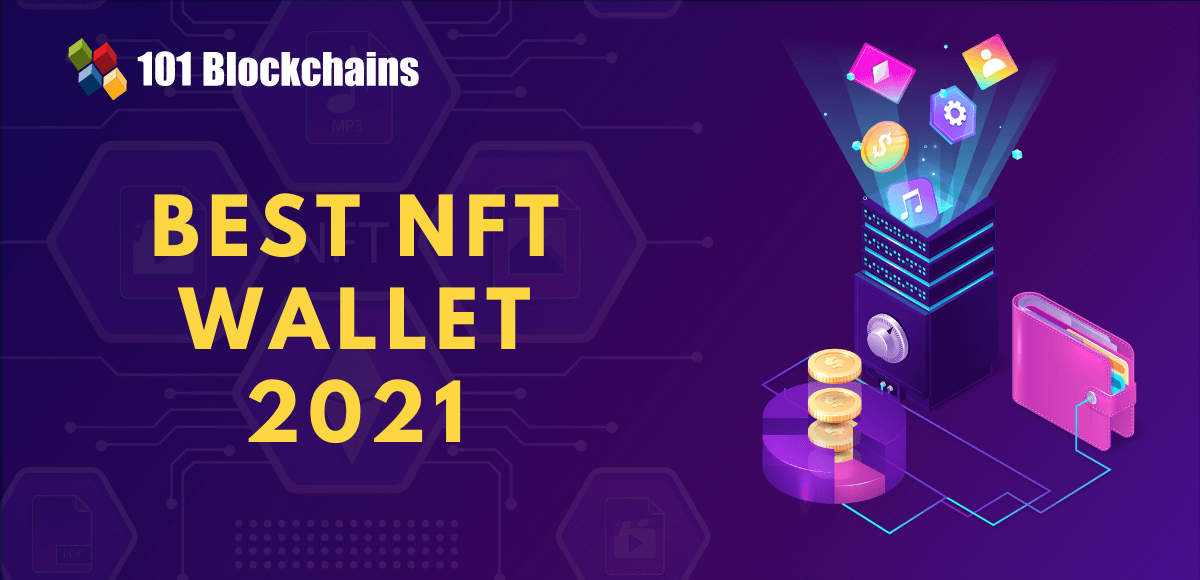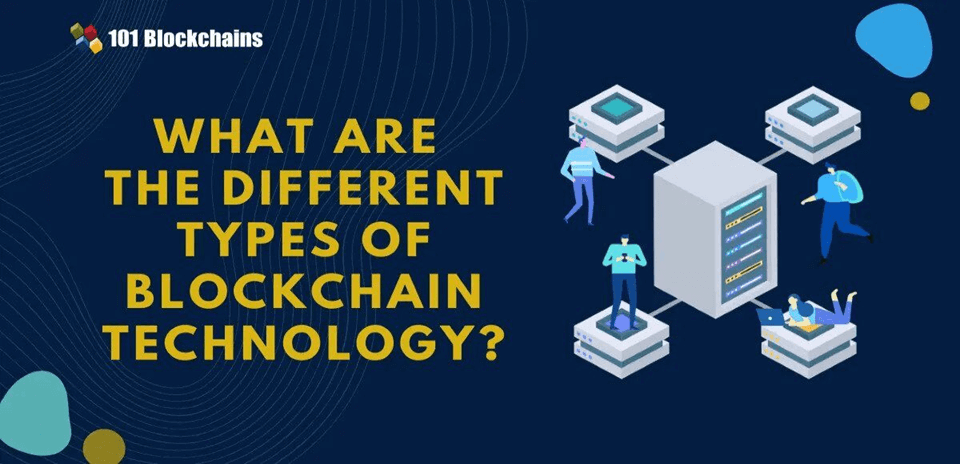Learn how blockchain truly works, master key definitions, and uncover what makes smart contracts so "smart." Dive into the fundamentals, gain valuable insights, and start your blockchain journey today!

- Reviews
Hasib Anwar
- on December 26, 2020
Blockchain For Logistics: Revolutionizing The Industry
The logistics and transport industry are the driving force behind any economy. However, the constant shift in economic structure and business needs is making this sector fall behind drastically. Let’s see how blockchain for logistics can change this scenario and become the backbone of this sector.
Although this sector is the driving force behind every sector, such as manufacturing, supply chain, agriculture, still due to the changes in the present time, the expectations are an all-time high. For example, lack of innovation, consumer expectations, and restrictive regulations is taking a toll on this industry at the moment.
Although the payout is still lucrative, shipping companies are missing out on a significant percentage of profit because of theft, inefficient business model, cyber-attacks, increasing costs, and so on. In many cases, mismanagement or stolen cargo can cost these companies up to $50 billion in losses every year!
However, blockchain can really change the scenario for logistics. In reality, blockchain can offer a more transparent and efficient business model for this sector. More so, as blockchain can act as a ledger system, so it’s perfectly suited for shipment tracking.
Thus, this guide will focus on what is blockchain’s role in logistics and real-world examples of blockchain in action.
Build your identity as a certified blockchain expert with 101 Blockchains’ Blockchain Certifications designed to provide enhanced career prospects.
Blockchain For Logistics: Why Logistics Is Falling Behind?

Increasing Transportation Costs
This is one of the major issues of this sector. In reality, transportation constitutes a major percentage of total expenses. For example, it covers 30% of the total expenses, which can go up to even 50% due to the increasing cost of fuels. The main issues are there are ways to solve this problem but not without the cost of affecting other aspects.
For example, you can reduce the carriers, but then you might have the risk of over-dependency. More so, you can consolidate shipments, but it runs the risk of delayed deliveries.
That’s why this sector needs another tool that can help them manage all these issues.
Inefficient Business Processes
Another major flaw of the sector is that the business processes are too inefficient. According to a survey, a vast majority of enterprises are dependent on their 3PL partners to improve the business process and reduce costs.
However, the logistics industry is still falling behind as they are still trying to follow old business models in these changing times. Maintaining stability, flexibility, and taking risks need strategic planning to be a success. But, due to the lack of efficient planning, the sector has to deal with losses.
Low Customer Service Quality
Customer service is an integral part of logistics. In reality, the dynamic market deals with a more complex supply chain and high consumer expectations. So, in both of these cases, making the delivery at the right time while maintaining quality is important.
Also, in many cases, consumers want the logistics provider to solve a multitude of issues regarding the products. So, the logistics company needs to hire a skilled person who can solve these issues without any problems. However, at the moment, the logistics industry doesn’t have the infrastructure to support all of these demands. And so, they end with low customer satisfaction.
No Transparency in Supply Chain
The issue is this industry doesn’t offer the amount of visibility you need to keep everything running as efficiently as possible. Also, the lack of transparency within the supply chain results in counterfeit products. More so, as there is no tracking of shipments in place, in many cases, the deliveries don’t make it in time.
Therefore, it becomes a massive issue as one missed deadline can cripple the ones that will come after it. Also, inventory management or warehouse management needs to step up the game as well.
Reduced Access to Supply Chain Finance
Supply chain finance plays a big part when it comes to logistics. In reality, it helps the companies to have a smooth experience in times when the geopolitical tensions or duties are uncertain. More so, access to such kind of finance really opens up the probability of ensuring a better output for these companies.
Typically, you need finance for freight audit payments, open accounts, and letter of credit. However, making sure that each element gets the cash flow in time is a difficult task. Any delays in payment will affect all the shippers and the outcomes.
Excited to learn about the supply chain in blockchain? Enroll Now in Enterprise Blockchains and Supply Chain Management Course
Adverse Impact of the Economy
This denotes political issues or uncertainty, low manufacturing performance, inflation, increasing consumer price index, and so on. Basically, all of these elements affect the number of services and products, ultimately affecting the need for logistics.
Thus, it becomes a massive issue when the economy is not stable, as it makes it difficult for the logistics companies to continue business in a time of crisis.
Driver Shortage
Another huge issue of this sector is the lack of drivers or skilled candidates in the logistics scene. In reality, governments tend to impose many regulations, which’s why companies have to be more selective when it comes to recruiting drivers.
Any kind of discrepancy that comes from the driver’s end impacts the company negatively. So, it’s a hassle to inspect every single driver and make sure they follow the rules accordingly. In many cases, the companies can’t track drivers, and they can take advantage of that shortcoming.
Complex Government Regulations
As you already know, governments can impose a lot of regulations over global shipments as they hold power to define the rules. Any products have to go through various safety and quality checks before they can go into the store. In many cases, the logistics company has to deal with this massive number of procedures. However, the main issue is all of these processes are time-consuming and full of errors.
Also, in many cases, corruption is deeply rooted in the system, which causes more problems in the long run.
Low Sustainability
As the logistics sector is heavily dependent on the various vehicles for delivery, they have to consider a large amount of carbon emission that happens. At the moment, governments are trying to reduce emissions and carbon footprints. So, therefore, the companies now have to optimize their routes, track the emissions, and even choose alternative fuels.
Not only is this a costly approach, but tracking the process is also fairly difficult.
Use of Legacy Technology
Even now, the logistics sector is using a legacy networking system, which is prone to errors. In reality, these legacy systems seem to limit the capabilities of enterprises. Also, these systems are slow and tend to decreases productivity.
That’s why logistics need to upgrade to more advanced technology to increase their productivity and save time and money. IoT or robotics can help out, but these also need a good firewall system or protective network that will keep out any cybercriminals.
Benefits of Blockchain In Logistics
The benefits of blockchain in logistics is tremendous. In reality, blockchain can offer a lot of features for this sector, which will highly increase the overall output of this industry. For example, blockchain can offer transparency to the supply chain. So, any kind of activity within the supply chain will be recorded in the ledger and accessible to everyone.
Another one of the benefits of blockchain in logistics is the tracking process. In reality, blockchain for the logistics industry can offer tracking of shipments from the production line to the consumer’s hand. Enterprises in the industry can even track the location of their shipments and make sure that the shipments are delivered on time.
Also, the decentralized infrastructure can finally get rid of any discrepancies within the ecosystem for good. Although a decentralized structure is somewhat not suited for enterprise companies, the features can still help this sector bloom properly.
We believe the best way it can help this sector is through a faster transaction process. As this industry depends heavily on timely payments at every stage, so a faster payment can really change the output and save a lot of time.
Thus, using blockchain, you can complete a transaction within seconds rather than taking days and weeks to process it.
If you want, you can use this article or guide as a blockchain in logistics pdf to study further about the topic.
Blockchain can offer a lot of benefits for other sectors too. Check out our guide on the benefits of blockchain technology to learn more about it.
8 Suitable Use Cases of Blockchain for Logistics
There are many use cases of blockchain in logistics. Let’s see some of the best use cases of blockchain in the transportation and logistics ecosystem.
-
Better Freight Tracking
Using blockchain in logistics and supply chain can help you to track down freight more easily. At present, the demand for on-demand and same-day deliveries are increasing. So, it’s a massive issue when it comes to logistics companies as they don’t have the ability to meet up with the needs of these increasing demands.
However, many trucking companies are already trying to invest in good tracking technology, but the security of these technologies is questionable.
Also, as these technologies don’t have a secured authentication process, cybercriminals or bad persons always take advantage of the network’s information.
Blockchain can really change the scenario here. As blockchain offers a proper authentication channel with verification, no one can now tamper with the data.
Also, as you can keep track of all your deliveries and track the deliveries in real-time, it can really ensure a better consumer experience for the logistics industry.
-
Security for the Internet of Things (IoT) Devices for Increasing Efficiency
As you already know, many companies are already using Internet of Things devices to track the products or maintain the quality all the time. However, these IoT devices are prone to cyberattacks because they tend to use cloud servers to communicate with each other, which is a vulnerable process.
So, here, blockchain in logistics and supply chain can offer security for these IoT devices and monitor all the data that comes from all of these devices. More so, it can also help analyze and categorize all the data from these devices to make changes in the business strategy.
Want to understand the fundamentals of the Internet of Things (IoT)? Enroll Now in IoT Fundamentals Course!
-
Effective Tracking of Transportation
The importance of tracking shipments is enormous. Without proper tracking channels, it’s quite impossible to make the delivery or schedule the deliveries on time. However, it’s a massive issue as, in many cases, the shipments can take a route that ultimately results in late delivery.
In reality, blockchain in logistics and supply chain can offer tracking of shipments from the production line to the consumer’s hand. Enterprises in the industry can even track the location of their shipments and make sure that the shipments are delivered on time.
Again, it can help in purchasing any second-hand vehicle and authenticate the information regarding the log’s past performance. So, you see, overall, it’s a great win for everybody.
-
Better Carrier Onboarding
Like the validation of the second-hand vehicle, blockchain can validate all the driver records for any new carrier. In reality, the process is quite time-consuming and full of hassles. More so, as it takes up a lot of time, the company does face certain issues for that too.
For example, a broker can reach a load capacity in a very specific location. So, he/she can identify the new carrier to assign it but can’t process it until the career is properly onboarded. In reality, in times of crisis, it can create more issues.
However, as blockchain is fully capable of handling the problem, any new driver’s onboarding process can happen within minutes. So, blockchain for logistics tracking feature can help keep track of all the onboarding processes in a time-friendly manner.
-
Vehicle to Vehicle Communication
Another major use case of blockchain is the option for vehicle-to-vehicle communication.
Many companies are already integrating V2V communications within their system. Therefore, freight vehicles can communicate with each other and form a platoon to improve safety, save fuel and time. However, the security of this information is really low, and it needs a proper channel for maintenance.
In reality, blockchain for logistics tracking options can quickly secure all the data from vehicle-to-vehicle communication processes and help the companies streamline the information efficiently. Therefore, companies can also use this tech to keep all the data safe from any cyber-attacks.
-
Reliable Load Boarding
This is one of the major problems of any logistics company. Many enterprises are constantly worried about the load boards as these data get tampered with, duplicated, or even full of errors. This can create an unreliable representation of consumer demands.
Without blockchain, the chance of duplication and errors will keep on rising as it can’t be handled manually anymore. But with blockchain for logistics tracking feature, shippers can directly update the with timestamps in the blockchain. As all the information in the blockchain gets verified, there is no chance of error or duplication.
So, it’s a huge benefit for the company and shippers.
-
Reduced Costing Using Smart Contracts
Another great use case of blockchain for logistics is the use of smart contracts in every stage. As you already know, the logistics industry deals with a lot of transactions in multiple stages. If even one of the delays, the whole system can fall apart. However, usually, these transactions take a hefty amount of time to process.
But if you start to use smart contracts in every stage, you can streamline the whole process within seconds. More so, you are also saving a lot of money by getting rid of the middleman. The best part is that you can automate all of the processes from blockchain if you start to use smart contracts in every stage.
Curious to understand the complete smart contract development lifecycle? Enroll in Smart Contracts Development Course Now!
-
Increased Liquidity in The Logistics Supply Chain
There are many applications with the blockchain ecosystem at play that focuses on the logistics sector. All of these try to deal with this sector’s major issue, which is liquidity, flexibility, and operations. The decreasing amount of liquidity in this sector is quite alarming as it gives rise to all kinds of problems.
But with blockchain, you can quickly solve the problem for good. In reality, blockchain has the ability to increase the liquidity within the supply chain for this sector. So, it could mean driver liquidity or carrier liquidity, and so on. Also, blockchain can authenticate every element of this sector to ensure that every element is on point.
If you want, you can use this article or guide as a blockchain in logistics pdf to study further about the topic.
Companies Using Blockchain In Logistics Industry
You just be wondering about the real-life implication of this technology. It’s quite normal to be skeptical about it. But to help you fully understand the depth of this technology, we’ve compiled a list of enterprise companies in the logistics industry that is using blockchain technology.
-
UPS
UPS is a major American carrier that is using blockchain in the logistics industry. In reality, they are working with Inxeption on a blockchain platform that will improve their merchant supply chain. More so, the name of the platform is Inxeption Zippy, and it will soon see the light of the day.
This platform will help companies list out, market, and even distribute any products to their customers. So, it’s a big win for the logistics industry.
-
DHL
DHL is another one of the blockchain in logistics examples that are using this technology for the betterment of this sector. In reality, they are working with Accenture on this. They have a proof of concept that will help trace the pharmaceutical from the manufacturing to the consumer.
This will mainly track the process that’s within the logistics jurisdiction rather than the manufacturing process.
-
J.B. Hunt Transport
J.B. Hunt Transport is another one of the examples of blockchain in logistics. In reality, they are working with BiTA or Blockchain in Transport Alliance. Together with this consortium, they plan to develop blockchain standards for logistics and educate the industry about this new technology. They believe blockchain is the solution for all the issues this sector is facing at the moment.
-
C.H. Robinson
C.H. Robinson is another one of the examples of blockchain in logistics. In reality, this company is a massive 3PL giant. This company is also working with Blockchain in Trucking Alliance (BiTA) to develop certain standards for this industry. Also, they are working on a platform that can help them improve efficiency.
Curious to learn about blockchain implementation and strategy for managing your blockchain projects? Enroll Now in Blockchain Technology – Implementation And Strategy Course!
-
Penske Logistics
Penske Logistics is another company that is using blockchain for the logistics industry. In reality, the company wants to increase the development of blockchain platforms in the transport industry so that they can create more applications in the markets.
At present, we are not sure about the exact platform, but we do know they will work on their food and beverage logistics.
-
NFI Industries
Another company is using blockchain for the logistics sector – NFI. In reality, this company is working with Blockchain in Transport Alliance (BiTA). More so, they want to use this consortium to grab opportunities in the field and expand to various technological initiatives, including blockchain.
-
GEODIS
GEODIS is another company that’s using blockchain for the logistics industry. Here, they are partnering with Project Verte for warehouse maintenance. Project Verte is actually an e-commerce platform that wants to offer warehousing opportunities for medium to small-sized brands. So, the collaboration within these two groups will result in more opportunities for smaller brands.
-
FedEx
FedEx is also using blockchain for logistics purposes. In reality, they want to integrate blockchain into their system, and they also completed the initial proof of concepts testing period. According to them, the test was a huge success, and now they are going for the full experience.
-
Ceva Logistics
Ceva Logistics is yet another company that is using blockchain for logistics use cases. In reality, Ceva is a Swiss-registered logistics giant. More so, they are now working with IBM and Maersk on their new TradeLens platform.
The best part is that they want to enhance the supply chain experience and also want to include transparency in their business model.
-
Werner Enterprises
Werner Enterprises is also using blockchain technology for the logistics sector. At present, they are collaborating with Blockchain in Transport Alliance (BiTA) to make sure that all the implementation of blockchain in this sector follows the same set of guidelines and rules. Also, they want to use it for their freight management.
Start your blockchain journey Now with the Enterprise Blockchains Fundamentals
Conclusion
Now that you know what blockchain is in logistics, you can understand how blockchain can really alter the scenario of this sector. In reality, blockchain is still a new technology, which needs more upgrading as of now. Still, it’s capable of handling all of the issues perfectly.
So, if you want to incorporate blockchain for your logistics company, you should definitely understand how this technology works. If you are just a novice and want to learn about this technology from a professional, we recommend starting with our Free Blockchain Course.
*Disclaimer: The article should not be taken as, and is not intended to provide any investment advice. Claims made in this article do not constitute investment advice and should not be taken as such. 101 Blockchains shall not be responsible for any loss sustained by any person who relies on this article. Do your own research!






